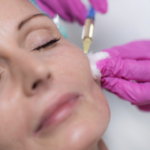Polynucleotide therapy (PN) has emerged as an innovative treatment for various skin concerns, including scars and stretch marks. As more individuals seek effective solutions for improving the appearance of their skin, understanding how this therapy works and its potential benefits for conditions like facial scars and stretch marks is essential.
What is Polynucleotide Therapy?
Polynucleotide therapy involves the use of polynucleotides, which are chains of nucleotides that play a crucial role in cell regeneration and repair. These molecules, derived from salmon DNA, are used in aesthetic medicine due to their ability to stimulate the healing process at the cellular level. When injected into the skin, polynucleotides can help promote tissue regeneration, enhance hydration, and improve overall skin texture and elasticity.
How Does Polynucleotide Therapy Work?
The primary function of polynucleotides in therapy is to promote cellular repair and regeneration. When administered to the skin, polynucleotide injections encourage the production of collagen and elastin—two essential proteins that support skin structure and elasticity. This is particularly beneficial for individuals suffering from scars or stretch marks, which result from damage to the skin’s underlying structure.
Polynucleotides have anti-inflammatory properties that help soothe the skin, reducing redness and swelling. By encouraging collagen production, they help improve the skin’s overall texture and resilience, making it a popular choice for those looking to rejuvenate their skin.
Facial Scars and Polynucleotide Therapy
Facial scars are often a result of acne, injury, or surgery. These scars can be emotionally distressing and may impact a person’s self-confidence. While there are various treatments available to minimize the appearance of scars, polynucleotide therapy has shown promising results.
Polynucleotides work by stimulating the skin’s natural healing processes, reducing inflammation, and increasing collagen production. This leads to smoother, more even skin texture and helps fill in depressed scars, making them less noticeable. For individuals with acne scars, polynucleotide therapy can promote the regeneration of the skin’s surface, leading to a more youthful, even complexion over time.
Stretch Marks and Polynucleotide Therapy
Stretch marks, or striae, occur when the skin is stretched rapidly due to factors like pregnancy, rapid weight gain, or growth spurts. These marks often appear as reddish or purplish streaks, gradually fading to a silvery-white color. Stretch marks can be stubborn and difficult to treat, but polynucleotide therapy offers a promising option.
By stimulating collagen and elastin production, polynucleotides help improve the skin’s elasticity and strength. When injected into areas affected by stretch marks, the therapy works to regenerate the skin, making the marks appear less prominent. Over time, the skin’s texture becomes smoother, and the stretch marks become less noticeable.
Benefits of Polynucleotide Therapy for Scars and Stretch Marks
- Stimulates Collagen and Elastin Production: Polynucleotides encourage the production of collagen and elastin, which are crucial for skin regeneration and healing. This can help both scars and stretch marks appear less noticeable.
- Reduces Inflammation: Polynucleotides have anti-inflammatory properties that help calm irritated or inflamed skin, improving the overall appearance of the treated area.
- Enhances Skin Texture and Elasticity: By promoting regeneration, polynucleotide therapy can improve the overall texture and elasticity of the skin, making it more youthful and smooth.
- Non-Invasive: Unlike more invasive procedures such as surgery or laser treatments, polynucleotide therapy is non-invasive, with minimal downtime and a lower risk of side effects.
- Hydrates and Revitalizes the Skin: Polynucleotides also help hydrate the skin, giving it a more plump and youthful appearance. This is particularly beneficial for areas affected by scars and stretch marks, as it can improve the skin’s overall health.
Conclusion
Polynucleotide therapy offers a promising solution for individuals seeking to improve the appearance of facial scars and stretch marks. By stimulating the skin’s natural healing processes, promoting collagen production, and improving elasticity, this therapy helps rejuvenate the skin, making scars and stretch marks less visible. While results may vary from person to person, polynucleotide therapy has shown to be an effective and non-invasive treatment option for those looking to restore their skin’s natural beauty. Always consult with a qualified dermatologist or aesthetic professional to determine if this therapy is suitable for your skin concerns. learn more here – https://drglynmedispa.com/polynucleotides/

